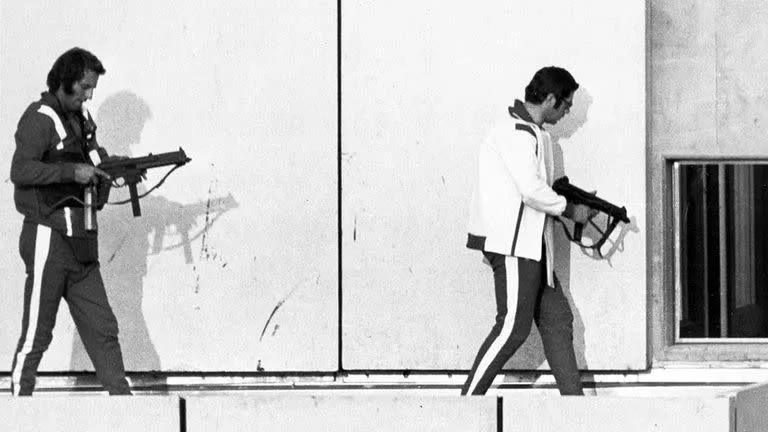The act of next Monday, in Munich, fifty years after the Massacre of the Olympic Games of 72, announces the presence of the German president Frank-Walter Steinmeier. There will be more than a thousand people between political and sports authorities. It threatens to be, however, an empty act. The relatives of the eleven Israeli athletes assassinated by the Black September Palestinian commando do not confirm their presence. They demand an apology from Germany, opening of files and greater compensation. “The ceremony on Monday,” Ankie Spitzer said, “is to calm the German national conscience, because we have only been lied to and humiliated.” Her friend Ilana Romano accompanies her: “They say that time heals, but let me tell you that it is not like that.”

Munich massacre during the 1972 Olympics
Romano and Spitzer were widowed at the age of 26. Yossi Romano (weightlifter) was executed by the terrorists as soon as they invaded the Olympic Village, in the middle of the morning of September 6. Ilana tells in “Munich 1972 and beyond” (one of the many documentaries of the tragedy), that her husband was castrated and bled to death. Andrei Spitzer (fencing coach) died hours later along with the other eight Israeli athletes who were taken hostage at the Furstenfeldbruck airbase. A police chief and five of the eight terrorists were also killed. With the negotiations buried, the rescue operation, everyone admits, was poorly planned. It is not known who killed whom. The German responsibility includes a more serious chapter: 53 days later, it released the only three survivors of the Palestinian commando, simulating the hijacking of a Lufthansa plane and, according to unofficial investigations, even paying 9 million dollars in exchange for no more attacks. Ilana Romano remembers the message of calm that her husband gave her before leaving for Munich: “When the Germans do something, they do it perfectly.”
Ankie Spitzer returned to Munich the day after the tragedy. She froze when she saw athletes training as if nothing had happened. The American Avery Brundage, historical defender of the 36 Berlin Games, full Nazi Germany, the most racist and anti-Semitic president that the International Olympic Committee (IOC) had, ordered a day of mourning and the immediate resumption of the competitions. The IOC took 49 years to accept a minute of silence (it just did so at the 2022 Tokyo Games). This week, for the anniversary of the Games, the IOC published extraordinary memories of some great champions of Munich 72, among others, the swimmer Mark Spitz (seven golds) and the 17-year-old Russian gymnast Olga Korbut. The report includes another video with the gratitude, now yes, of the relatives of the murdered athletes. Point in favor for Thomas Bach, president of the IOC. He is also German.

Munich massacre during the 1972 Olympics
The last documentary of the massacre (”Death and Games – Munich ’72″) finds Mohammed Safady, one of the two Palestinian terrorists still alive (the rest of those involved, innocents included, were killed year after year by the Israeli Mossad, the hunt narrated by Steven Spielberg in “Munich”). “I’m proud of what I did,” Safady says in that latest report. The same was said by the other survivor, Jamal al-Gashey, in “One Day in September” (Oscar winner in 2000). Mahmoud Abbas, president of the Palestinian Authority, was asked two weeks ago on a visit to Berlin if he did not apologize for the Massacre. “From 1948 to today,” Abbas challenged, “Israel committed 50 massacres in 50 Palestinian cities… 50 massacres, 50 holocausts. If we want to keep digging into the past, let’s do it.” He said “Holocaust.” It was a scandal in Germany and Israel. Abbas rectified and described the Holocaust as the “most heinous crime in the modern history of humanity.” They also questioned Abbas’s use of the word “apartheid.” But Amnesty International and Human Rights Watch, and even the Israeli organization B’Tselem, already use it too to denounce the inhuman control that Israel exercises over the lives of Palestinians.

September 5, 1972 file photo shows a hooded member of the Black September group that took members of the Israeli Olympic team hostage in their quarters in the Munich Olympic Village.
Last Monday, Ludwig Spaenle, Bavarian Anti-Semitism Commissioner, recalled Germany’s “first-level state failure” in Munich 72 and asked Chancellor Olaf Scholz to increase compensation to relatives. Fearful of the fiasco, Germany, which has already paid $85,000 per victim, uploaded a new proposal yesterday. The relatives ask for about 9 million per victim, a complex debate in the midst of pain. The relatives “feel like participants in the theater of the absurd,” wrote Yossi Melman in the Israeli daily Haaretz. To the fiasco of the operation, Germany added the delay of 45 years to raise a Memorial. There will be the ceremony on Monday. “After 50 years of abuse, lies and insults, our patience has run out. Enough. No more”, the relatives warned in a public letter. “This second German failure,” warned Suddeutsche Zeitung, the country’s main newspaper, could be “morally even worse than the first in 1972.” The newspaper notes that historically, and even today, Germany speaks of the attack as an “Olympic bombing.” Too weak. “It doesn’t even convey the horror” of what happened. The rest of the world, the newspaper says, calls it something else instead: “The Munich Massacre.”

